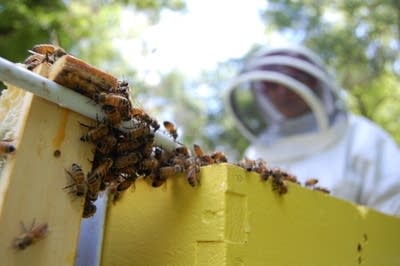New law makes beekeeping all the buzz in Minneapolis

Beekeeping is now legal in Minneapolis, after being banned for more than three decades. The change has beekeepers rejoicing - cautiously.
Keeping bees has been legal in Minneapolis for about a month now after the new law sailed through the city council on a unanimous vote. Supporters say it will do wonders to promote honeybees, which are critical to the production of crops and other plants. "It's exciting that they are legal but it's also difficult."
Standing in the shade of her backyard Elise, a beekeeper--who asked that her last name not be published because her beehives are still illegal--isn't so sure the new law makes sense. She hasn't yet met the requirements of the new law.
The rules say beekeepers have to register their hives for $100 up front and $50 a year after that. They also have to fence in their yards and get consent from most of the neighbors within 100 feet.
Create a More Connected Minnesota
MPR News is your trusted resource for the news you need. With your support, MPR News brings accessible, courageous journalism and authentic conversation to everyone - free of paywalls and barriers. Your gift makes a difference.
Elise said her immediate neighbors already know she has bees and don't mind, but because she's new on her block, she worries that her bees might not be welcomed by everyone.
"What I fear is that people are hesitant to say yes to bees if you ask them because they haven't experienced them or they'll just say, 'no I have allergies,'" she said.
A small percentage of the population is dangerously allergic to bee stings, which can cause serious and deadly reactions in those people. But for most people, the pain and swelling that happen after a sting will usually go away without medical treatment.

Still, the new law requires fencing designed to force bees high up in the air and out of the way of people. Many beekeepers have complained the requirement is unnecessary or excessive. University of Minnesota bee expert Marla Spivak said the new law is meant to be tough.
"The laws are a little excessive but I think they were necessary to get it approved because many people are really afraid of bees and of stinging insects so I think the public wants to know that there are enough safeguards in place," she said.
Spivak said part of the problem is that people often confuse stinging insects like yellowjackets and hornets with bees, which are normally not aggressive.
Back at the bee yard, Elise wears elbow-length mustard yellow gloves and a netted white helmet. She fires up the beesmoker, a special hand-pumped fabric and metal contraption with a long snout that looks sort of like a watering can.

"I'm going to begin a little fire that will confuse the bees," she said, tearing some newspaper to light the fire. "When they become aware of the smoke they go into the hive and they fatten up with honey so they become more docile and they are less likely to swarm around when you are in the hive."
Armed with the smoker, Elise makes her way to the hives, which are painted wooden boxes a few feet high. She's looking for signs of overcrowding and disease.
Her two hives are home to between 40,000 and 60,000 bees. They hover in the air as she opens the lid to one of the hives. More bees come out as she works, making little bee shadows everywhere.
Elise has been keeping bees illegally for five years now. It hasn't always been easy. For most of that time, she lived in apartments and kept her hives scattered around the city in friends' yards. At one point, the city discovered them, fining her and forcing her to move. She said she plans to register her hives and come out of the shadows soon.
Experts say they hope the new law attracts more beekeepers to the hobby, because bees are in steep decline. Scientists around the world are working to pinpoint why they're dying off. The exact causes are unknown but many suspect a combination of habitat destruction, pesticides, pests and disease.
That's the main reason Elise said she keeps bees.

"If I can't farm in the city," she said, "I can raise bees and honey and be a part of pollination of things in the city."
Fresh honey is an added bonus. Her two hives produce about 150 pounds of fresh honey each year.
She puffs out some smoke to keep the bees calm as she inspects a honeycomb.
"Wow, the honey is just glistening. It's completely fresh honey."
Dipping a spoon into the honey, Elise said she'll bring some along to woo her neighbors as she goes door to door to ask their consent.
"It's the folks that I don't know that I worry about, who are four or five houses down or across the street that don't know me, that might think I'm crazy or think that beekeeping in the city is a crazy thing to do," she said.
Elise said most people who get the chance to experience beekeeping - and the fresh honey it produces - lose their fear and end up supporting it.
The city says, so far, just five people have registered their hives. Anyone caught without a permit faces a $200 fine for the first offense. Officials say they plan to step up publicity for the new law to help get the word out.

